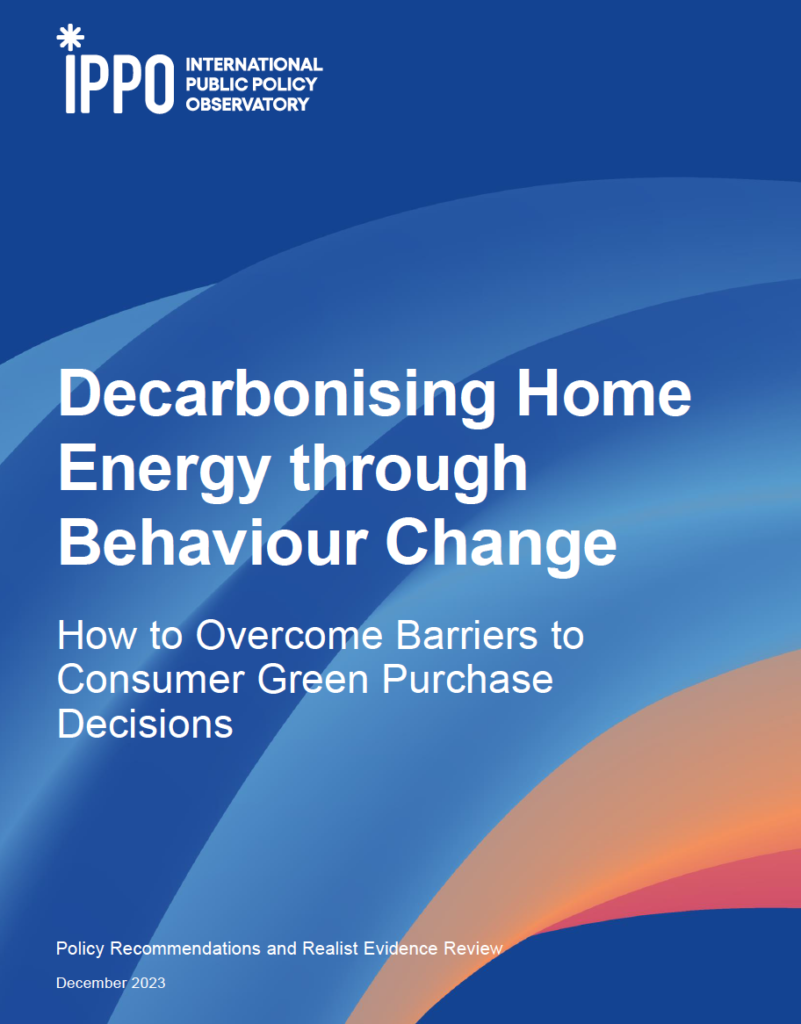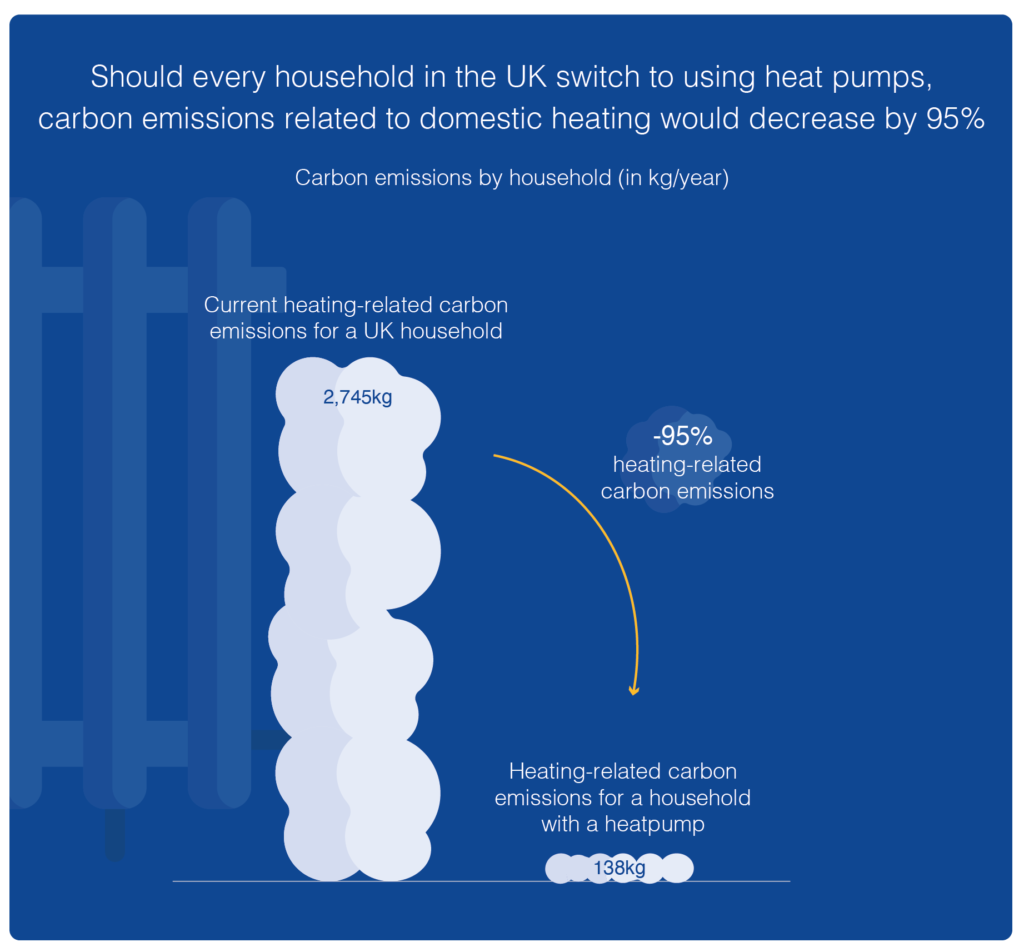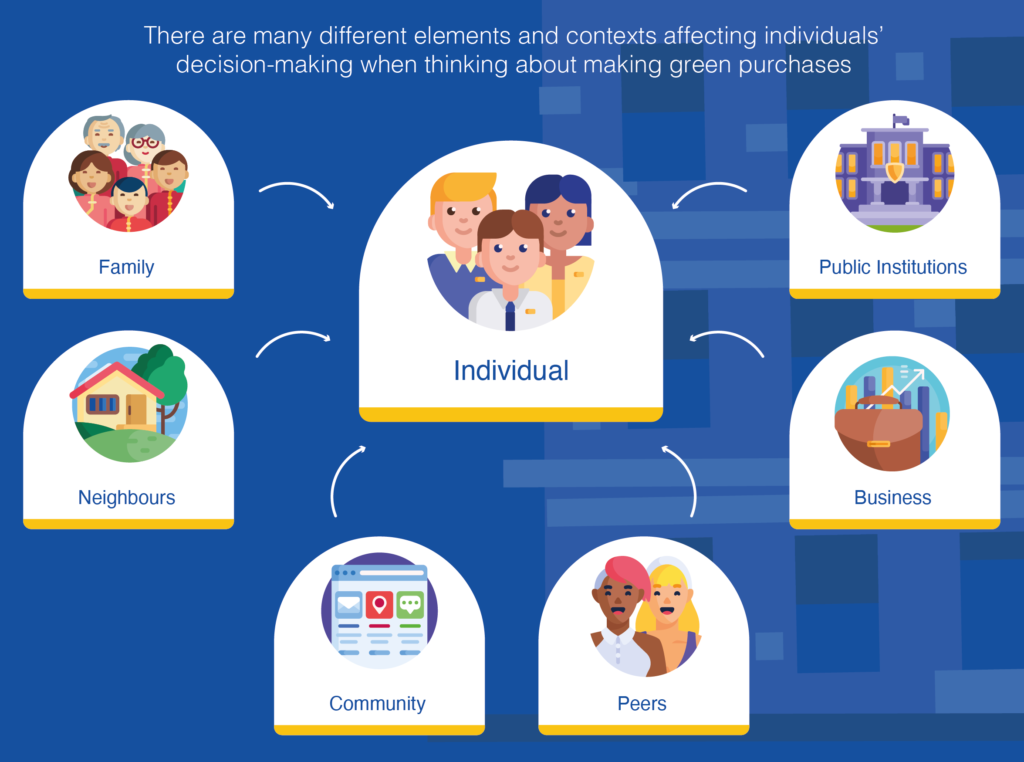Decarbonising Home Energy Through Behaviour Change: How to Overcome Barriers to Green Purchase Decisions

Carol Vigurs, Jeremy Williams, Rosa Mendizabal-Espinosa, Rachel Francois-Walcott, Zihan Wang, Dylan Kneale, Mukdarut Bangpang
How to Overcome Barriers to Consumer Green Purchase Decisions
The UK’s goal of sharply cutting carbon emissions will only be met if householders buy heat pumps or other energy efficient interventions such as insulation. But the UK is not on track to achieve Net Zero and is far behind countries such as Norway, Finland, France, and Italy on metrics like heat pump installation. UK efforts to encourage green purchases have so far been mainly focused on improved technology or offering limited financial incentives – but these have not had the desired effect. A new approach is therefore needed.
Informed by behavioural science and international best practice, this review by the International Public Policy Observatory (IPPO) and the UCL EPPI Centre argues that making interventions focused on behavioural and human factors, and the contexts and systems that shape these factors, are likely to increase the likelihood of consumers making green purchases. We argue that a neglect of these individual and social contexts is partly to blame for the current low levels of take-up – and that addressing them can help motivate individuals when they are considering making a green purchase.
Please read the full report below

Drawing both on the review’s findings and our work with stakeholders, IPPO makes the following key recommendations to national and local government to encourage consumer green purchase decisions:
IPPO’s Recommendations to Encourage Green Purchases
Recommendation 1 – Establish and promote consistent incentive structures for green purchases.
The incentive structure for green purchases should be reformed to respond to the differing contexts which householders operate in. We recommend its restructuring to a wider, sliding-scale of income-based incentives including working with finance partners on green low-interest loans and mortgages for insulation.
Recommendation 2 – Set up Home Upgrade Agencies to co-ordinate consistent messaging and offer bespoke advice and pathways to householders.
The current incentive and regulation structure around decarbonising homes largely operates on a “one-size-fits-all” basis, limiting their reach and effectiveness. New agencies should be set up which use data-driven segmentation techniques common in marketing to provide tailored advice and financial support to consumers under the required wider incentive structure.
Recommendation 3 – Run a competition promoting innovative ways to minimise the disruption when installing heat pumps.
The review demonstrates that perceived disruption is one of the key barriers to consumers installing heat pumps. Governments should incentivise industry innovation through organising a competition to install heat pumps swiftly and with minimum interference for householders.
Recommendation 4 – Capitalise on the additional time available before the phase-out of fossil fuels in home heating in the UK by further prioritising insulation and an attendant programme of activity across society.
The UK government’s extension of the window for the phase-out of gas boilers to 2035 provides a window of opportunity to further ramp up behaviour-focused activity on other aspects of home decarbonisation, especially on insulation.
About the Review
Actionable Evidence for Policy
The International Public Policy Observatory (IPPO) exists to provide policymakers with the evidence and knowledge they need to confront big strategic challenges, including achieving Net Zero.
As a result of our conversations with policymakers across government, IPPO was asked to review and produce actionable recommendations to encourage householders to make green purchase decisions, including on heat pumps.
To do this, we convened roundtable discussions with experts from across government, the private sector, academia, and civil society. We produced and published a systems map, including a review of the strength of evidence on what drives these green purchases. And we collaborated with UCL’s EPPI Centre to commission this Realist Review to ensure our recommendations to government were informed by the evidence.
The Need to Change Course
If the UK is to achieve Net Zero, a different approach is required to accelerate the decarbonisation of Britain’s homes.
There is no route to achieving Net Zero without a radical reduction in carbon emissions from home energy use.
The graphic below demonstrates the transformative effect of radically increasing the take-up of heat pumps on carbon emissions in the UK.

Why Do People Purchase Heat Pumps – or Choose Not To?
Building on our conversations with stakeholders from across society, the review looked at the why and how of householders’ decision-making on green purchases including heat pumps. We assessed the existing evidence and made comparisons with other countries to look at what we could learn from them here in the UK.
Understanding Behaviour Change
Our review used the COM-B Model of Behaviour Change to understand that an individual’s decision-making is influenced by numerous factors and contexts. This includes government policy, as well businesses and institutions, their local community, interpersonal relationships, and other individual concerns.

Policy Recommendations
Using this approach, we argue that making interventions focused on human and behavioural factors and contexts will be effective when encouraging consumers to make decisions about decarbonising their homes.
Our recommendations are based on a desire to influence the contexts which inform how individuals make decisions. We believe that intervening in these contexts can increase the likelihood of householders making green purchases.
Key Findings and Policy Recommendations of the Review
| Key Finding | Policy Recommendation |
| The upfront costs, running costs and non-financial costs of heat pumps such as disruption currently outweigh the benefits for most UK homes that have gas central heating and poor insulation. | Have a greater role for insulation plus heat pump and hybrids bundling as a home energy incentive to reduce the double disruption of insulation and installation. This condenses the disruption of insulation and installation into one event and recognises the role of insulation in heat pump efficiency and user satisfaction. |
| Poorly insulated homes are a barrier to access incentives to change home heating | Work with finance partners for pump prime green low interest loans, mortgages for insulation. Work with providers to reduce non-financial costs concerns, such as refunds if not satisfied. |
| Climate change and environmental concerns are an important driver to behaviour change, but on their own are not enough. Future-proofing homes and reducing bills are also important drivers behind heat pump purchases. | – Reform energy pricing to decouple it from the price of gas and harvest the benefits of renewable energy production with cheaper electricity. – Support demand side flexibility Time of Use tariffs to support managing increased electricity demands. – Support markets for renewable energy tariffs to incentivise switching from gas to electricity with lower bills. – Promote reaching Net Zero as an ethical movement people can belong to. – Promote low carbon heat as the “new normal” for homes. |
| Instigating behaviour change to high value, high commitment green purchases requires multiple approaches. Interventions to promote behaviour change need to be targeted at multiple levels: at the individual, at the household level, and at the community and policy-regulatory levels. | – Ensure consistency in government messaging and greater use of wider, structural interventions to reduce carbon. – Use the extra time from the postponement of ending fossil fuels in homes to 2035 to “catch up” on insulation in line with other European countries. – Change the first ECO+ central heating grant to heat pumps instead of offering first time or replacement gas central heating. – Re-engage enquirers who dropped out of considering previous low carbon heating home incentives. – Address structural and systematic barriers to heat pump purchasing. |
| Interventions targeted at lower incomes are not the highest carbon emitting homes. | Widen reach to middle and higher incomes with a sliding scale of income-based incentives. |
| Highly targeted interventions may not reach enough people to decarbonise homes or develop a competitive heat pump market. | – Work with finance partners for pump prime green low interest loans and mortgages for insulation. – Widen the reach of incentives to middle and higher income groups by working with finance partners for green low interest loans and mortgages. |
| Awareness of heat pumps is only weakly associated with purchase. | Work with retail to provide physical demonstration sites for heat pumps in electrical showrooms. |
| Installers play a crucial role as developers, designers, partners and consultants. Heat pump performance and satisfaction depends more on installation quality than users’ behaviour. | – Provide greater investment in capacity and skills-building and in the availability of heat pump installers as partners. – Institute longer-term incentives for heat pumps installation to ensure an ongoing market for installation and a diversity of participants. |
| Advice by a credible messenger is a driver of purchases. However, scepticism of greenwashing stalls purchase decisions in the slower to adopt. | Fund and promote independent, tailored expert advice services which should be well-known and trusted. |
| There is a gap between the technical performance in measures of efficiency of heat pumps and measures of success that are important to users. | – Consider reforming EPC certificates to more accurately reflect home users’ heating behaviours in energy use against building fabric. – Make home heating surveys part of the buying process as part of a “new normal” akin to other homebuying surveys. |
Get in Touch
IPPO continues to work with national and local governments across the country to support the UK in reaching Net Zero. Want to collaborate with us? Get in touch at ippo@ucl.ac.uk
